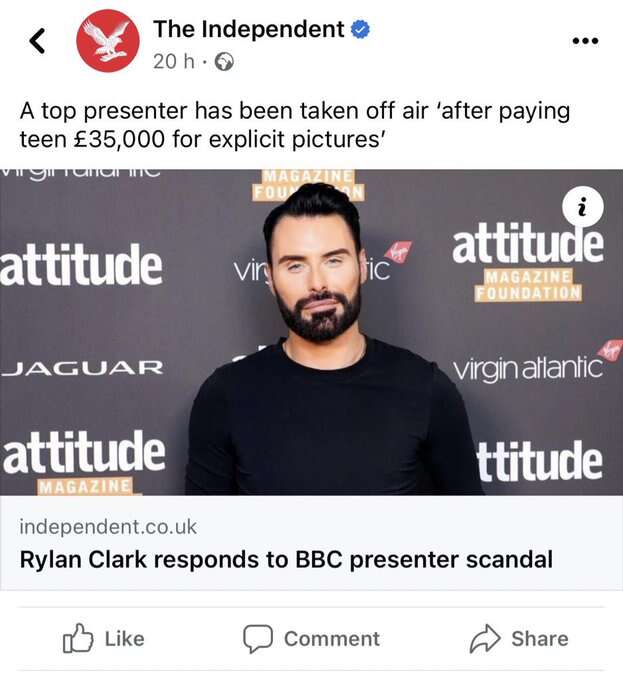
The Sun’s front-page story about a sex scandal involving an unnamed BBC presenter has set off a cascade of legal actions and complaints from unrelated BBC names.
Meanwhile, questions have been raised about why The Sun and others have not named the star at the centre of the story.
Legal considerations for The Sun, and others, include: defamation (the onus is on The Sun to prove the story is true) and privacy (however breaches of privacy can be justified in the public interest).
The Sun’s front page on Saturday revealed that a well-known BBC presenter is accused of paying a teenager £35,000 for “sordid images”. The arrangement is said to have begun when the teenager was 17.
Independent’s Rylan Clark Facebook post
The Independent published a story to Facebook illustrated with a picture of presenter Rylan Clark and captioned: “A top presenter has been taken off air ‘after paying teen £35,000 for explicit pictures.’” The social media headline read: “Rylan Clark responds to BBC presenter scandal.”

The post, which was published at 2.40pm on Saturday, remained online in that form until approximately 20 hours later, when Clark publicly complained about it on Twitter. The post, which had received 145 reactions, was then edited to correct the mistake within half an hour of Clark’s complaint.
It was subsequently replaced with a story titled: “‘That ain’t me’: Rylan Clark and Jeremy Vine respond to BBC presenter scandal.”
Clark said in another tweet: “I ask all media outlets to please be careful with their subtext when using my photo surrounding such serious stories. People don’t always read the full text.”
The incident kicked off a cascade of criticism of The Independent, both from other journalists and other commentators.
[Read more: Independent duped by joke tweet that Prince Harry is Shenseea fan]
Legal action from BBC presenters over false allegations
At the same time a number of BBC presenters who are not the person referenced in the Sun story have been libelled on Twitter by people speculating about the identity of the man in question.
BBC Five Live presenter Nicky Campbell reported an anonymous Twitter user called FPL_WULF to the police after they wrongly claimed that he was the presenter.
He said: “I think it’s important to take a stand. There’s just too many of these peole on social media. Thanks for your support friends.”
BBC Radio 2 presenter Jeremy Vine singled out one Twitter user – @andyplumb4 – as one “among many people tweeting lies about me”.
He said: “I don’t know who Andy Pumb is, but a defamation lawyer advised me that what he did on Twitter yesterday is the quickest way to lose £20,000.”
After threatening the man with legal action, he responded:
But it seems that Andy has upset a lot of people on Twitter, because quite quickly I was told exactly who he is…. pic.twitter.com/D3doBmuq2Q
— Jeremy Vine (@theJeremyVine) July 9, 2023
Plumb responded that he only drinks at the weekends and sends “daft tweets” when pissed. Vine indicated that he will be taking legal action.
Meanwhile Plumb continues to tweet from his blue tick verified account to his 17,600 followers.
Numerous high-profile BBC presenters felt the need to issue messages distancing themself from the scandal, including the corporation’s highest-paid on-screen star Gary Lineker who said: “Hate to disappoint the haters but it’s not me.”
Former rugby star and BBC sports presenter Brian Moore also said he was taking legal action over someone who implicated that he was involved in the scandal. Moore eventually retweeted an apology from the person who made the allegation and said: “This is an end to this matter, as I have no desire to bankrupt people over ill-judged insinuations.”
Why hasn’t The Sun named the alleged perpetrator?
The main consideration behind not naming the presenter at the centre of these allegations would appear to be defamation.
The Sun would have the account of the alleged victim’s mother as evidence via a sworn affadavit. The Sun also makes clear it has not paid the woman for her story. But it does not appear to have seen the compromising messages itself.
Truth is an absolute defence against defamation but the onus is on the publisher to prove the story is correct.
Privacy would be another consideration, following a string of rulings that have changed the level of risk publishers are willing to show.
As the allegations appear to be criminal in nature, with the police now taking a look, The Sun may have had a strong public interest justification for naming the star.
But, in active criminal cases at least, the precedent towards naming suspects when there is a public interest has dwindled. Merely reporting the fact that someone is subject of a criminal investigation (prior to charge) can constitute an invasion of privacy, as shown by the Bloomberg Supreme Court case last year.
[Read more: Why the Tory MP arrested on suspicion of rape has not been named in the media]
Email pged@pressgazette.co.uk to point out mistakes, provide story tips or send in a letter for publication on our "Letters Page" blog
